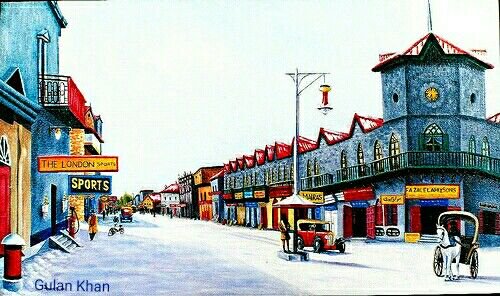The City of Karezes (Quetta)
By Dr. Javed Iqbal Sayyid
(translated from the original Urdu by the poet, with slight modifications by this blogger)
Oh, the city of hundreds of beautiful faces[1]!
You may rememberHow this land basin of yours
Was ever filled with love.
And the people
of all the colors of roses
used to live here.
Some had grown from your soil
along with the pine trees.
Others who came to this land
were molded
into the same clay,
their ancestors
buried under the same clay
of your water and soil.
Oh, the city of “shinas”[2]
you know it very wellthat like the snow-clad
tops of Mt. Zarghoon
whatever they were or not
your people
were loyal to you.
They were never ungrateful
unlike the shrieking cranes
flocks of which always flew
over your vale at sunset
and which the children
always longed to see
perched on one of your blossoming almond trees.
Oh, the city of my friends,
You must not have forgottenthat all our residents
knew each other
as if they were
the members of the same clan.
Like the frozen lashes
of icicles
hung from your
roof tops
They lived,
And died together.
Like those cracking sheets of ice
on which my friends strolledand melted with
the slightest warmth of love!
True and pure of heart as they were,
they harbored no ill-will against any one.
Oh, the city of six tongues,
please note thatdespite this diversity
every one spoke in the same dialect,
the distinct dialect of Quetta.
Free of any grammatical restraints
this common dialect of your people
was authentic and unpretentious
words flowed out naturally,
growing like wild flowers
and the abuses of friends in it were like those
intoxicating vines of grapes
which forced them to call for more and more
and they got more in return.
Oh, the city of my beloved ones
I still rememberwith hearts being generous
city lanes also seemed spacious
when the buildings were not high
the sky always accompanied us
it would descend on the far end of the road
over the gigantic pine trees
just to be with you.
But oh
The city of karezes!Today, with this old map of yours,
when I went out to look for you,
I saw that all the spots and sites
of my childhood memory had been erased,
Those sky high pine trees
had been cut down,And those rose vines that covered
the walls of the houses were
replaced with steel-nails.
When young, where we used to
pluck delicate wild flowers in the open,there instead I saw solid, colored bricks
displayed over
the same walls.
Seeing all this
made me feel as ifthis was done just a day before,
as if someone with a piece of coal
had drawn a cross on my bare chest;
as if all the titles and the sub-titles
of my childhood tale
were instantly washed away.
As if someone
had suddenly fallen into a deep karez!
But oh! The city of my loved ones
the only consolation isthat my friends
with their hard work
have installed new plants of silver and gold,
have elevated their old tin-roof huts
to multi-story market places
and fortresses of their own!
Oh, the city of Dokani Baba[3]!
may God bless you still morewith your abundance.
I pray that each of your abodes
gets filled with wealth.
I pay my compliments for the fame
you have earned.I congratulate you for your unprecedented growth.
And now that I am leaving,
I make a humble request:
Before it is too late
please take good care of yourself,and take good care of my friends,
lest their hearts
which are like the
fragile mirrors of white ice,
one day become hardened
like your tiles of marble!
(Javed Iqbal Sayyid, July 1996, Quetta)
P.S. Prof. Dr. Javed Iqbal Sayyid, former Vice Chancellor of Allama Iqbal Open University (AIOU), a friend of friends, a man of many talents (from boxing to poetry!) and, above all, an illustrious son of Quetta passed away in January 2019. Allah Bakhshay. May he rest in peace.
[1] In
the original Urdu version, these faces are compared with the light pink color
of rubarb ( called rawaash in the
vernacular), a local sweet and sour vegetable suitable for salads.
[2]
Shinay are small, green dried berries
with oily rind sold in heaps at dry fruit shops or hawked on carts on the streets
of Quetta.
[3]
Dokani Baba’s real name was Abdul Qudus. He was one of the Sufi elders of the city who used to wander around on the streets of Quetta, always wearing the same
clothes all year long. People used to offer him food and money, but he always
refused. It is narrated that one day he asked for some paisas from a shop
keeper. The shop keeper, showing him his empty cash box, said that he did not
have any and that baba should wait for a while till he gets some customers. The
baba asked the shopkeeper to open his cash box again and when he did he found
the box full of crisp bills, of currency notes! From that day onward the old
malang became known as Dokani Baba.











No comments:
Post a Comment